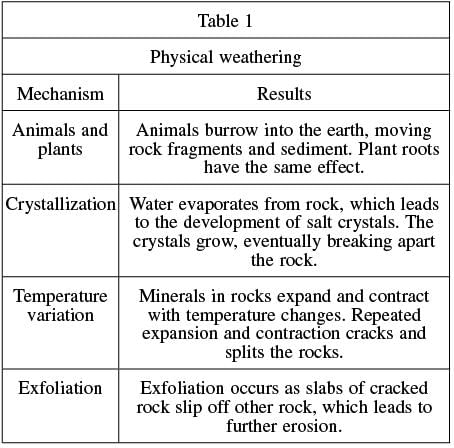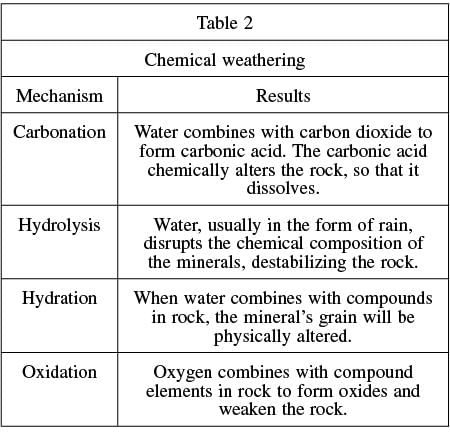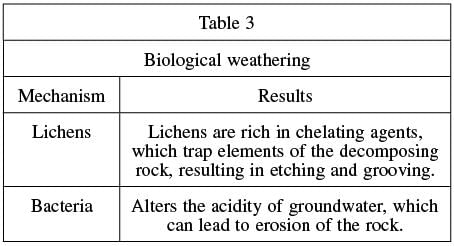ACT Exam > ACT Questions > Directions:Read the passages and choose the b...
Start Learning for Free
Directions: Read the passages and choose the best answer to each question.
Passage
The term weathering refers to the processes that cause surface rock to disintegrate into smaller particles or dissolve in water. These processes are often slow, taking place over thousands of years. The amount of time that rock has been exposed to the elements (primarily wind and water) influences the degree to which the rock will weather.
Weathering processes are divided into three categories: physical, chemical, and biological.
Table 1 shows some of the factors that contribute to physical weathering.

Chemical weathering occurs when minerals in rock are chemically altered. Table 2 shows some of the factors that contribute to chemical weathering.

Plants and bacteria contribute to biological weathering. The ultimate product of biological agents on rock is soil. Table 3 shows some factors of biological weathering.
Passage
The term weathering refers to the processes that cause surface rock to disintegrate into smaller particles or dissolve in water. These processes are often slow, taking place over thousands of years. The amount of time that rock has been exposed to the elements (primarily wind and water) influences the degree to which the rock will weather.
Weathering processes are divided into three categories: physical, chemical, and biological.
Table 1 shows some of the factors that contribute to physical weathering.

Chemical weathering occurs when minerals in rock are chemically altered. Table 2 shows some of the factors that contribute to chemical weathering.

Plants and bacteria contribute to biological weathering. The ultimate product of biological agents on rock is soil. Table 3 shows some factors of biological weathering.

Q. Rainwater is slightly acidic, and it can dissolve many minerals over time. This process is most consistent with the mechanism of:
- a)exfoliation.
- b)oxidation.
- c)hydrolysis.
- d)chelation.
Correct answer is option 'C'. Can you explain this answer?
Most Upvoted Answer
Directions:Read the passages and choose the best answer to each questi...
The best answer is c. According to Table 2, the result of hydrolysis is the disruption of “the chemical composition of the minerals, destabilizing the rock.” Table 2 indicates that rainwater is the usual cause of this type of weathering, which best supports answer choice c.

|
Explore Courses for ACT exam
|

|
Directions:Read the passages and choose the best answer to each question.PassageThe term weathering refers to the processes that cause surface rock to disintegrate into smaller particles or dissolve in water. These processes are often slow, taking place over thousands of years. The amount of time that rock has been exposed to the elements (primarily wind and water) influences the degree to which the rock will weather.Weathering processes are divided into three categories: physical, chemical, and biological.Table 1 shows some of the factors that contribute to physical weathering.Chemical weathering occurs when minerals in rock are chemically altered. Table 2 shows some of the factors that contribute to chemical weathering.Plants and bacteria contribute to biological weathering. The ultimate product of biological agents on rock is soil. Table 3 shows some factors of biological weathering.Q.Rainwater is slightly acidic, and it can dissolve many minerals over time. This process is most consistent with the mechanism of:a)exfoliation.b)oxidation.c)hydrolysis.d)chelation.Correct answer is option 'C'. Can you explain this answer?
Question Description
Directions:Read the passages and choose the best answer to each question.PassageThe term weathering refers to the processes that cause surface rock to disintegrate into smaller particles or dissolve in water. These processes are often slow, taking place over thousands of years. The amount of time that rock has been exposed to the elements (primarily wind and water) influences the degree to which the rock will weather.Weathering processes are divided into three categories: physical, chemical, and biological.Table 1 shows some of the factors that contribute to physical weathering.Chemical weathering occurs when minerals in rock are chemically altered. Table 2 shows some of the factors that contribute to chemical weathering.Plants and bacteria contribute to biological weathering. The ultimate product of biological agents on rock is soil. Table 3 shows some factors of biological weathering.Q.Rainwater is slightly acidic, and it can dissolve many minerals over time. This process is most consistent with the mechanism of:a)exfoliation.b)oxidation.c)hydrolysis.d)chelation.Correct answer is option 'C'. Can you explain this answer? for ACT 2025 is part of ACT preparation. The Question and answers have been prepared according to the ACT exam syllabus. Information about Directions:Read the passages and choose the best answer to each question.PassageThe term weathering refers to the processes that cause surface rock to disintegrate into smaller particles or dissolve in water. These processes are often slow, taking place over thousands of years. The amount of time that rock has been exposed to the elements (primarily wind and water) influences the degree to which the rock will weather.Weathering processes are divided into three categories: physical, chemical, and biological.Table 1 shows some of the factors that contribute to physical weathering.Chemical weathering occurs when minerals in rock are chemically altered. Table 2 shows some of the factors that contribute to chemical weathering.Plants and bacteria contribute to biological weathering. The ultimate product of biological agents on rock is soil. Table 3 shows some factors of biological weathering.Q.Rainwater is slightly acidic, and it can dissolve many minerals over time. This process is most consistent with the mechanism of:a)exfoliation.b)oxidation.c)hydrolysis.d)chelation.Correct answer is option 'C'. Can you explain this answer? covers all topics & solutions for ACT 2025 Exam. Find important definitions, questions, meanings, examples, exercises and tests below for Directions:Read the passages and choose the best answer to each question.PassageThe term weathering refers to the processes that cause surface rock to disintegrate into smaller particles or dissolve in water. These processes are often slow, taking place over thousands of years. The amount of time that rock has been exposed to the elements (primarily wind and water) influences the degree to which the rock will weather.Weathering processes are divided into three categories: physical, chemical, and biological.Table 1 shows some of the factors that contribute to physical weathering.Chemical weathering occurs when minerals in rock are chemically altered. Table 2 shows some of the factors that contribute to chemical weathering.Plants and bacteria contribute to biological weathering. The ultimate product of biological agents on rock is soil. Table 3 shows some factors of biological weathering.Q.Rainwater is slightly acidic, and it can dissolve many minerals over time. This process is most consistent with the mechanism of:a)exfoliation.b)oxidation.c)hydrolysis.d)chelation.Correct answer is option 'C'. Can you explain this answer?.
Directions:Read the passages and choose the best answer to each question.PassageThe term weathering refers to the processes that cause surface rock to disintegrate into smaller particles or dissolve in water. These processes are often slow, taking place over thousands of years. The amount of time that rock has been exposed to the elements (primarily wind and water) influences the degree to which the rock will weather.Weathering processes are divided into three categories: physical, chemical, and biological.Table 1 shows some of the factors that contribute to physical weathering.Chemical weathering occurs when minerals in rock are chemically altered. Table 2 shows some of the factors that contribute to chemical weathering.Plants and bacteria contribute to biological weathering. The ultimate product of biological agents on rock is soil. Table 3 shows some factors of biological weathering.Q.Rainwater is slightly acidic, and it can dissolve many minerals over time. This process is most consistent with the mechanism of:a)exfoliation.b)oxidation.c)hydrolysis.d)chelation.Correct answer is option 'C'. Can you explain this answer? for ACT 2025 is part of ACT preparation. The Question and answers have been prepared according to the ACT exam syllabus. Information about Directions:Read the passages and choose the best answer to each question.PassageThe term weathering refers to the processes that cause surface rock to disintegrate into smaller particles or dissolve in water. These processes are often slow, taking place over thousands of years. The amount of time that rock has been exposed to the elements (primarily wind and water) influences the degree to which the rock will weather.Weathering processes are divided into three categories: physical, chemical, and biological.Table 1 shows some of the factors that contribute to physical weathering.Chemical weathering occurs when minerals in rock are chemically altered. Table 2 shows some of the factors that contribute to chemical weathering.Plants and bacteria contribute to biological weathering. The ultimate product of biological agents on rock is soil. Table 3 shows some factors of biological weathering.Q.Rainwater is slightly acidic, and it can dissolve many minerals over time. This process is most consistent with the mechanism of:a)exfoliation.b)oxidation.c)hydrolysis.d)chelation.Correct answer is option 'C'. Can you explain this answer? covers all topics & solutions for ACT 2025 Exam. Find important definitions, questions, meanings, examples, exercises and tests below for Directions:Read the passages and choose the best answer to each question.PassageThe term weathering refers to the processes that cause surface rock to disintegrate into smaller particles or dissolve in water. These processes are often slow, taking place over thousands of years. The amount of time that rock has been exposed to the elements (primarily wind and water) influences the degree to which the rock will weather.Weathering processes are divided into three categories: physical, chemical, and biological.Table 1 shows some of the factors that contribute to physical weathering.Chemical weathering occurs when minerals in rock are chemically altered. Table 2 shows some of the factors that contribute to chemical weathering.Plants and bacteria contribute to biological weathering. The ultimate product of biological agents on rock is soil. Table 3 shows some factors of biological weathering.Q.Rainwater is slightly acidic, and it can dissolve many minerals over time. This process is most consistent with the mechanism of:a)exfoliation.b)oxidation.c)hydrolysis.d)chelation.Correct answer is option 'C'. Can you explain this answer?.
Solutions for Directions:Read the passages and choose the best answer to each question.PassageThe term weathering refers to the processes that cause surface rock to disintegrate into smaller particles or dissolve in water. These processes are often slow, taking place over thousands of years. The amount of time that rock has been exposed to the elements (primarily wind and water) influences the degree to which the rock will weather.Weathering processes are divided into three categories: physical, chemical, and biological.Table 1 shows some of the factors that contribute to physical weathering.Chemical weathering occurs when minerals in rock are chemically altered. Table 2 shows some of the factors that contribute to chemical weathering.Plants and bacteria contribute to biological weathering. The ultimate product of biological agents on rock is soil. Table 3 shows some factors of biological weathering.Q.Rainwater is slightly acidic, and it can dissolve many minerals over time. This process is most consistent with the mechanism of:a)exfoliation.b)oxidation.c)hydrolysis.d)chelation.Correct answer is option 'C'. Can you explain this answer? in English & in Hindi are available as part of our courses for ACT.
Download more important topics, notes, lectures and mock test series for ACT Exam by signing up for free.
Here you can find the meaning of Directions:Read the passages and choose the best answer to each question.PassageThe term weathering refers to the processes that cause surface rock to disintegrate into smaller particles or dissolve in water. These processes are often slow, taking place over thousands of years. The amount of time that rock has been exposed to the elements (primarily wind and water) influences the degree to which the rock will weather.Weathering processes are divided into three categories: physical, chemical, and biological.Table 1 shows some of the factors that contribute to physical weathering.Chemical weathering occurs when minerals in rock are chemically altered. Table 2 shows some of the factors that contribute to chemical weathering.Plants and bacteria contribute to biological weathering. The ultimate product of biological agents on rock is soil. Table 3 shows some factors of biological weathering.Q.Rainwater is slightly acidic, and it can dissolve many minerals over time. This process is most consistent with the mechanism of:a)exfoliation.b)oxidation.c)hydrolysis.d)chelation.Correct answer is option 'C'. Can you explain this answer? defined & explained in the simplest way possible. Besides giving the explanation of
Directions:Read the passages and choose the best answer to each question.PassageThe term weathering refers to the processes that cause surface rock to disintegrate into smaller particles or dissolve in water. These processes are often slow, taking place over thousands of years. The amount of time that rock has been exposed to the elements (primarily wind and water) influences the degree to which the rock will weather.Weathering processes are divided into three categories: physical, chemical, and biological.Table 1 shows some of the factors that contribute to physical weathering.Chemical weathering occurs when minerals in rock are chemically altered. Table 2 shows some of the factors that contribute to chemical weathering.Plants and bacteria contribute to biological weathering. The ultimate product of biological agents on rock is soil. Table 3 shows some factors of biological weathering.Q.Rainwater is slightly acidic, and it can dissolve many minerals over time. This process is most consistent with the mechanism of:a)exfoliation.b)oxidation.c)hydrolysis.d)chelation.Correct answer is option 'C'. Can you explain this answer?, a detailed solution for Directions:Read the passages and choose the best answer to each question.PassageThe term weathering refers to the processes that cause surface rock to disintegrate into smaller particles or dissolve in water. These processes are often slow, taking place over thousands of years. The amount of time that rock has been exposed to the elements (primarily wind and water) influences the degree to which the rock will weather.Weathering processes are divided into three categories: physical, chemical, and biological.Table 1 shows some of the factors that contribute to physical weathering.Chemical weathering occurs when minerals in rock are chemically altered. Table 2 shows some of the factors that contribute to chemical weathering.Plants and bacteria contribute to biological weathering. The ultimate product of biological agents on rock is soil. Table 3 shows some factors of biological weathering.Q.Rainwater is slightly acidic, and it can dissolve many minerals over time. This process is most consistent with the mechanism of:a)exfoliation.b)oxidation.c)hydrolysis.d)chelation.Correct answer is option 'C'. Can you explain this answer? has been provided alongside types of Directions:Read the passages and choose the best answer to each question.PassageThe term weathering refers to the processes that cause surface rock to disintegrate into smaller particles or dissolve in water. These processes are often slow, taking place over thousands of years. The amount of time that rock has been exposed to the elements (primarily wind and water) influences the degree to which the rock will weather.Weathering processes are divided into three categories: physical, chemical, and biological.Table 1 shows some of the factors that contribute to physical weathering.Chemical weathering occurs when minerals in rock are chemically altered. Table 2 shows some of the factors that contribute to chemical weathering.Plants and bacteria contribute to biological weathering. The ultimate product of biological agents on rock is soil. Table 3 shows some factors of biological weathering.Q.Rainwater is slightly acidic, and it can dissolve many minerals over time. This process is most consistent with the mechanism of:a)exfoliation.b)oxidation.c)hydrolysis.d)chelation.Correct answer is option 'C'. Can you explain this answer? theory, EduRev gives you an
ample number of questions to practice Directions:Read the passages and choose the best answer to each question.PassageThe term weathering refers to the processes that cause surface rock to disintegrate into smaller particles or dissolve in water. These processes are often slow, taking place over thousands of years. The amount of time that rock has been exposed to the elements (primarily wind and water) influences the degree to which the rock will weather.Weathering processes are divided into three categories: physical, chemical, and biological.Table 1 shows some of the factors that contribute to physical weathering.Chemical weathering occurs when minerals in rock are chemically altered. Table 2 shows some of the factors that contribute to chemical weathering.Plants and bacteria contribute to biological weathering. The ultimate product of biological agents on rock is soil. Table 3 shows some factors of biological weathering.Q.Rainwater is slightly acidic, and it can dissolve many minerals over time. This process is most consistent with the mechanism of:a)exfoliation.b)oxidation.c)hydrolysis.d)chelation.Correct answer is option 'C'. Can you explain this answer? tests, examples and also practice ACT tests.

|
Explore Courses for ACT exam
|

|
Signup for Free!
Signup to see your scores go up within 7 days! Learn & Practice with 1000+ FREE Notes, Videos & Tests.
























